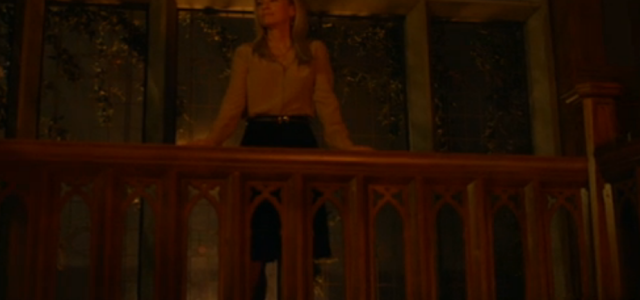
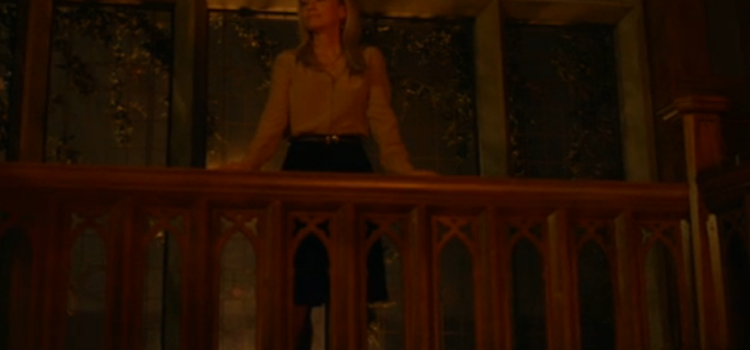
Arrow #2.20 “Seeing Red” Recap & Review
Recaps & Reviews April 27, 2014 Derek B. Gayle

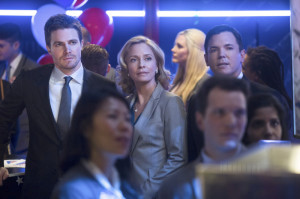 Summary: A paper thin plot becomes a distraction from a much larger and significantly better final bow, in a strangely structured episode with a phenomenal ending.
Summary: A paper thin plot becomes a distraction from a much larger and significantly better final bow, in a strangely structured episode with a phenomenal ending.
If you have not seen this episode yet and do not wish to be spoiled, do not continue reading!
Recap
Felicity and Diggle are watching Roy, who has been comatose since his rescue from Slade’s experiments. Felicity notes that nothing about Isabel Rochev has been written anywhere, while S.T.A.R. labs is working on a cure for the Mirakuru. Roy suddenly awakens, completely devoid of his humanity, and rips through the team to escape. Meanwhile Oliver contemplates getting a place with Sara, which she’s put-off by.Their conversation is cut off by the call about Roy, and the team embarks on the search. They realize that Roy is trying to find Thea—he is hallucinating that she is telling him to punish her—and is mindlessly going to places connected to his recent past, and his violent path leads them to him. When Arrow and Canary confront Roy in the clock tower, Roy injures Oliver’s knee and kills cops during his escape. Sara considers killing Roy, especially considering the danger he put Sin in, but Oliver tries to convince her not to. Thea sees the footage of Roy’s rampage on the news and realizes it’s Roy, and learns from Sin that he was injected with a drug that’s had side-effects.
Meanwhile, Moira contemplates dropping out the race when she realizes she needs to devote more time to Thea, but Oliver convinces her to stick with the race. In the process, Moira reveals to Oliver that she’s known he was the Arrow since the Undertaking, but is proud of him. After Thea makes an appearance during Moira’s election speech so Roy might see her on the TV, Roy heads to Verdant to confront her. Sara very nearly kills him, but Sin stops her from doing it. Oliver shoots Roy with arrows filled with the League’s snake venom, putting him back in a coma. Sara realizes how close she came to killing Roy, and decides to leave the team “to see an old friend.” On the drive home, Thea, Moira and Oliver talk about the damage their secrets have caused, but just before Moira can reveal that Malcolm Merlyn is alive, they are struck by another vehicle. When they wake up, they are tied up—and Slade is there, re-enacting the scene on the island when Shado was killed, forcing Oliver to choose between Moira and Thea. Oliver refuses and offers himself up as a sacrifice, but Moira breaks in and offers herself instead. Slade acknowledges her courage, and then stabs her with his sword.
In flashback, we learn that Oliver made another girl pregnant while dating Laurel. He admitted it to Moira, who then covered it up by paying the girl $2 million to claim she had a miscarriage and go to Central City, never to speak to Oliver again. Oliver remains unaware that his child may still be alive.
Review
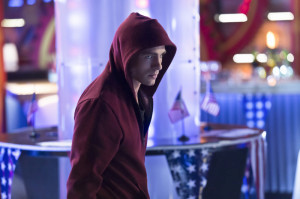 “Seeing Red” is not the kind of episode any of us expected. Now, many of the events happening in it are things we knew were coming, particularly the culmination of Roy and the Mirakuru. And even Moira’s death was something of a foregone conclusion (I said her actions in “Deathstroke” might come back to bite her…just not this soon!) But it’s how these events unfold that’s surprising, in an episode that seems to make itself appear poorly put-together on purpose, strange as that may be.
“Seeing Red” is not the kind of episode any of us expected. Now, many of the events happening in it are things we knew were coming, particularly the culmination of Roy and the Mirakuru. And even Moira’s death was something of a foregone conclusion (I said her actions in “Deathstroke” might come back to bite her…just not this soon!) But it’s how these events unfold that’s surprising, in an episode that seems to make itself appear poorly put-together on purpose, strange as that may be.
The major plot to the episode is paper thin, which essentially amounts to “Team Arrow chases Raging Roy everywhere.” A good 75% of the episode just isn’t all that interesting or imperative, as Roy ends up pretty much exactly where he started in the teaser. Granted, he is technically a cop-killer now, and Sin and Thea have both seen him at his worst. That’s a big deal, but it wouldn’t be unthinkable to let him come back from it, letting everyone placing the blame on the Mirakuru. The predictable route is going down the redemption road once he’s cured, using a Red Arrow persona to make up for the harm he caused this week. But frankly, that’s all less interesting than anything else going on in the episode.
Again, that seems to be a very specific choice. So much of “Seeing Red” uses the “Royd Rage”—a pun from the marketing team that’s both horrifically awful and stunningly amazing—to keep attention away from Moira, while simultaneously giving her a final bow without us realizing. Whether or not it retains that shock factor is purely subjective; I called Moira’s death about ten minutes in, as soon as the flashback’s plot and parental-theme became apparent, while plenty of others, writers here included, enjoyed just how much they absolutely did not expect it. In fact, the best and worst part about this episode’s structure is how hard it is to determine whose story the main plot belongs to until the final scene. It could be Roy’s story, the culmination of his Mirakuru rage, except we see very little from his point of view. It could be Thea’s story, as everything good in her life unravels. It could be Sara’s story, as she realizes just how far gone she is as a killer. Arrow has a knack for constantly running multiple threads at once without losing focus, but the circumstances this week—a main villain who’s also a major protagonist who’s also essentially a shell of himself—necessitates a very different way of telling the story. Aside from the decent shocker in the very good hallucinatory Thea scene, most of the Roy stuff is fairly bland, but the way it forces everyone around him to react keeps the episode interesting until its ending.
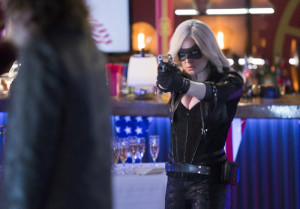 But while Roy’s material is merely boring, it’s Sara’s plotline that ends up being the weakest of the bunch. There’s nothing wrong in concept; her introductory episodes were all about escaping the life of an assassin. But “Birds of Prey” seemed to wrap up the discussion about Sara being irredeemable, and bringing it up again so soon and so abruptly feels a bit rehashed and forced. It’s a smart place to take the character, but the build-up doesn’t quite check out. The reasoning is that she’s prompted to think about it after Oliver accidentally asks her to move in with him, but that twists her original point of confusion—whether or not murder is justified—into “I’m not good enough for my boyfriend” self-hate, which leaves a bad taste in one’s mouth. Luckily, the best part about the story is how she comes to her final revelation mostly thanks to Sin’s actions, as Bex Taylor-Klaus is always a joy to watch. And sending Sara off to meet an “old friend”—a return appearance from Katrina Law as Nyssa, perhaps?!—is surely set-up for something big for her at season’s end.
But while Roy’s material is merely boring, it’s Sara’s plotline that ends up being the weakest of the bunch. There’s nothing wrong in concept; her introductory episodes were all about escaping the life of an assassin. But “Birds of Prey” seemed to wrap up the discussion about Sara being irredeemable, and bringing it up again so soon and so abruptly feels a bit rehashed and forced. It’s a smart place to take the character, but the build-up doesn’t quite check out. The reasoning is that she’s prompted to think about it after Oliver accidentally asks her to move in with him, but that twists her original point of confusion—whether or not murder is justified—into “I’m not good enough for my boyfriend” self-hate, which leaves a bad taste in one’s mouth. Luckily, the best part about the story is how she comes to her final revelation mostly thanks to Sin’s actions, as Bex Taylor-Klaus is always a joy to watch. And sending Sara off to meet an “old friend”—a return appearance from Katrina Law as Nyssa, perhaps?!—is surely set-up for something big for her at season’s end.
Willa Holland, meanwhile, pulls off the tough act of keeping Thea sympathetic in spite of her, well, spitefulness. Much of that is simply due to how well Thea has been written in the episodes preceding; she’s shown a level of intelligence and competence this season, which justifies why her actions now aren’t the “teen attitude” of last season. Thea’s always been on the outside looking in when it comes to the Queen family drama, constantly finding out the horrible secrets second hand. Holland makes it clear that Thea isn’t angry anymore, just done, and the coldness towards Oliver and Moira is well-played. It’s also nice to see Thea so proactive this week; that election speech plan is clever (and effective), and it’s fun seeing her continue to connect the dots about everything on her own. Considering that she’ll have to learn the truth about Oliver after this week’s world-shattering ending, this season may have been secretly building Thea up as a competent enough person to believably join Team Arrow—or, perhaps, become a viable nemesis, depending on how things play out. If anything, the sudden horror she’s been thrown into, coupled with the Malcolm Merlyn element, makes Thea a wild card now.
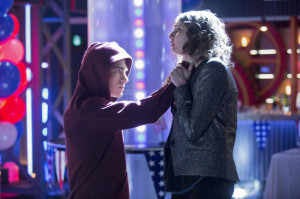 Oliver is in the odd position of being mediator between many of these intersecting arcs, constantly trying to keep his family from splintering while talking Sara down. It’s normal for him to be the connective tissue in any episode’s given plot, of course, but involving him so heavily in every thread is another way of distracting the audience from the episode’s true nature. His brutal knee injury is even a bait and switch; it’s teased as a fairly big plot point, but in the end he still beats Roy and would have likely been just as helpless in that final scene with Slade. That, again, makes it hard to really say if the non-Moira lead-up is solid or not. You could argue that the knee injury is what made Oliver unable to get up and fight in the final scene, but that’s not implied onscreen at all; is it weak filler in the writing, or another purposeful piece of the long con? Because it all helps Team Arrow remain squarely focused on Roy and their own internal drama, thus keeping Deathstroke references to a minimum and letting the Moira stuff stand independently, for the most part.
Oliver is in the odd position of being mediator between many of these intersecting arcs, constantly trying to keep his family from splintering while talking Sara down. It’s normal for him to be the connective tissue in any episode’s given plot, of course, but involving him so heavily in every thread is another way of distracting the audience from the episode’s true nature. His brutal knee injury is even a bait and switch; it’s teased as a fairly big plot point, but in the end he still beats Roy and would have likely been just as helpless in that final scene with Slade. That, again, makes it hard to really say if the non-Moira lead-up is solid or not. You could argue that the knee injury is what made Oliver unable to get up and fight in the final scene, but that’s not implied onscreen at all; is it weak filler in the writing, or another purposeful piece of the long con? Because it all helps Team Arrow remain squarely focused on Roy and their own internal drama, thus keeping Deathstroke references to a minimum and letting the Moira stuff stand independently, for the most part.
The most independent of the Moira material is in the flashback, an example of Arrow pulling out a soap opera trope and bestowing it with genuine pathos. For one, Oliver’s reaction to the pregnancy shines a good light on the decent person lying beneath Oliver even at his most disgusting point. Stephen Amell plays Oliver’s reaction to the news of the miscarriage wonderfully, with a properly muted sadness when he admits, reluctantly and disappointingly, that he couldn’t possibly be ready to be a father. Moira’s subterfuge is bad in typical Moira Queen style, but you can’t argue with the results. An alternate universe could have Oliver as a deadbeat dad and a child with a horrible life, and even if Oliver made a great father to his illegitimate child, it’d mean Starling City wouldn’t have the Arrow it so desperately needs now. The show cleverly does not name the mother of Oliver’s child, but it’d be silly for it to not be Sandra Hawke, introducing a thread that can be picked up at any point when the show needs to revisit it. Either way, it’s hard to argue with Moira’s actions—at least she didn’t immediately order a hit on the girl or something—but that “I feel dirty for agreeing with her” feeling encapsulates the ambiguity that’s made Moira such an engaging character.
Moira telling Oliver she knows his identity—one last wonderful example of Thompson and Amell’s chemistry—is a beautifully played and surprisingly quiet reveal, and further emphasizes that Moira might have one of the best understandings of her children a mom could possibly have. As much trouble as she’s caused, it speaks volumes that she can comprehend the complexity of Oliver’s dual identity and find pure pride in it. It’s also an insightful comparison between the two; both have done some dirty things for the sake of the greater good. Oliver is constantly debating when the ends justify the means, while Moira fully believes that they always do, at least when they come to her children. Moira herself says it best in her flashback: “When it comes to your children, there is no action that is inconceivable. There is no decision that is impossible. You do what you must to provide the life that they need.” We ourselves may not believe that to be true, but Thompson sells it so well that we can’t fault Moira for buying it.
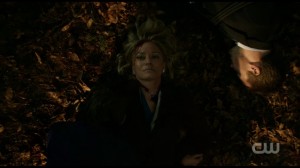 That all allows the pivotal final scene plays out to absolute perfection, will all four actors completely on point and utterly devoted to what might be the biggest moment in the show so far. It’s the best use of “dirty and gritty” filmmaking, taken literally here, as Thompson, Holland and Amell deliver their lines out of breath, high anxiety, and high energy. It’s a superbly tense scene because of how not rehearsed it feels, with words stuttered, misplaced emphasis, and the constant sounds of heavy breathing taking up most of the background. It’s a horrifying scenario, playing out even worse when juxtaposed with Manu Bennett’s complete focus, and it’s a scene that’s both uncomfortable to watch but impossible to turn away from.
That all allows the pivotal final scene plays out to absolute perfection, will all four actors completely on point and utterly devoted to what might be the biggest moment in the show so far. It’s the best use of “dirty and gritty” filmmaking, taken literally here, as Thompson, Holland and Amell deliver their lines out of breath, high anxiety, and high energy. It’s a superbly tense scene because of how not rehearsed it feels, with words stuttered, misplaced emphasis, and the constant sounds of heavy breathing taking up most of the background. It’s a horrifying scenario, playing out even worse when juxtaposed with Manu Bennett’s complete focus, and it’s a scene that’s both uncomfortable to watch but impossible to turn away from.
The context of “Seeing Red” matters more than writer’s intention, then, because it’s very much an episode written for emotional resonance rather than breaking narrative barriers. In fact, Arrow has a penchant for playing even the most tired superhero/soap opera tropes so straight that they manage to work again, mostly due to the general competence from the actors and creators. The car crash is such an overdone TV drama thing to do, especially cutting off Moira’s biggest secret, but Arrow arguably pulls it off in the best way it can. Plenty of shows would make this the episode ender, or even season ender in some cases, but Arrow gives it the two-fold purpose of being both a stellar act-break and a huge narrative turning point. The last few minutes of “Seeing Red” seem to be pulled from a different episode entirely, and yet its final moments—which tie back into the family drama, the flashback, and the season-arc—fall right into place.
That is, ultimately, what makes “Seeing Red” work beyond simply the stellar last scene. Moira’s thread through the episode doesn’t necessarily have her become a new person, but emphasizes the person she is, flaws and all. It’s clear in her death and through the flashbacks that Moira’s major arc pretty much concluded at the end of season one when she publicly took the fall for the Undertaking. What we see here isn’t a character-trajectory she was necessarily leading to, but an embracing of the person she’s been—and the character we’ve loved—from the get-go. She is the ultimate mama bear, a mother who will go to absolutely any lengths to protect her children, no matter how dirty anyone else might think they are. This is nothing new for us, and it’s something Moira’s expressed since day one. But her final episode reinforces it one last time, confirming that it doesn’t matter if her individual actions were despicable or benevolent, because her intentions were always with her children in mind.
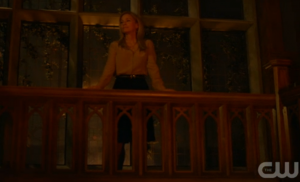 It’s Susanna Thompson, as usual, who steals the show throughout all this. Both in the flashback and in the present, Thompson presents Moira’s worldview with the utmost sternness. This is a Moira who already knows what she wants and believes, and the only shaky bit is if she can redeem herself at the same time. And while she may not get to show the city she’d be a good mayor, she proves that protecting her children and being heroic can cross over, as it does when she takes the brunt of Slade’s vengeance. Moira is resolved to sacrifice herself for her children—the gutpunch of a line, “There’s only one way this night can end”—and doesn’t even hesitate to do it. Moira did a lot of things we couldn’t possibly agree with, but no one can argue with her intentions. Despite what the episode does for most of its running time, it’s that final bit of understanding and the last look at Moira’s heroic side that makes the death all the more tragic, and bestows a newfound focus and momentum for this season’s final episodes.
It’s Susanna Thompson, as usual, who steals the show throughout all this. Both in the flashback and in the present, Thompson presents Moira’s worldview with the utmost sternness. This is a Moira who already knows what she wants and believes, and the only shaky bit is if she can redeem herself at the same time. And while she may not get to show the city she’d be a good mayor, she proves that protecting her children and being heroic can cross over, as it does when she takes the brunt of Slade’s vengeance. Moira is resolved to sacrifice herself for her children—the gutpunch of a line, “There’s only one way this night can end”—and doesn’t even hesitate to do it. Moira did a lot of things we couldn’t possibly agree with, but no one can argue with her intentions. Despite what the episode does for most of its running time, it’s that final bit of understanding and the last look at Moira’s heroic side that makes the death all the more tragic, and bestows a newfound focus and momentum for this season’s final episodes.
Odds & Ends
- Seriously, though. Susanna Thompson, we’re going to miss you.
- This is the first episode without a “My name is Oliver Queen” intro, instead beginning with a recap that opens with Moira onscreen first. Then the title card at the end overlaps with the final notes on the piano score rather than playing the sound effect. It’s clear that this episode will be different right at the top, and doesn’t cut the burst of emotion at the end, either.
- This episode was originally the slot for the backdoor Flash pilot. Considering the ridiculous momentum of the last few episodes, it may be a blessing that we didn’t come to a full-stop for that here.
- The editing of the episode is unique for the show, though I’m not sure if they’re the choices of director Douglas Aarniokoski or the editing team. There are quite a few more dissolves than usual—the dissolve into Roy’s psychosis scene, the more muted dissolve effect between present and flashback, etc.—and the jerky transition to Oliver’s awakening in the last act is awesome.
- We get a confirmation that Slade’s psychosis isn’t just his own mind, but that hallcinations actually a side-effect of the Mirakuru. Which is going to make these Mirakuru soliders really interesting.
- The doctor’s gratitude is a nice superhero-y scene on it’s own, but it feels misplaced in the episode. This kind of scene would have worked in something like “Three Ghosts,” or really any episode that dealt with Oliver’s uncertainty. It doesn’t quite fit thematically, and it there are many ways they could have written around it. Ultimately, it just feels like padding.
- Oliver jumping down the stairs into the Arrowcave with his messed up leg is great, as is the hilarious breather of a scene that comes after it—particularly Felicity gagging after Oliver injects himself and the whole “Is this really all muscle?” bit.
- Not sure if the brief shot of Sin in a hood in the alley was supposed to be funny or just a fake-out, but it’s really odd.
- Last week, Matt pointed out how lame Oliver’s motorcycle accident excuse was. This week, guess which excuse Oliver uses yet again?
- I’m sorry, but I can’t believe that playboy Oliver has never even heard of trigonometry.
- “There is no force on this earth that can make you a bad person.” – It’s so cute how Diggle is Felicity’s biggest fan.
- “You show true courage. I am truly sorry…you did not pass that on to your son.” The pause, and subsequent false hope, between “I am truly sorry” and the rest is a great delivery from Manu Bennett.
A SECOND OPINION
by Matt Tucker
It was what had to be. Slade set the scene as a revisit for Oliver, a cold, vicious callback to one of the worst choices of both of their lives, and the next step in the plan to tear everything about Oliver’s world down. Yet, Moira choosing to give up her life and Slade ultimately taking it after one final feint was the true consequence of the world that she had built for herself.
When introduced to Moira Queen at the beginning of the series, we were teased with a mother who seemed to have a devious and duplicitous hidden life. Then, we got to know her, and it became evident that she was someone caught up in circumstances far outside of her control, someone with which we could actually sympathize. But this is a show never to settle for simple, and the complexity of Moira we were left with was something much more muddy, much more bloody, and far from innocent or outright guilty. At least, not guilty in the same ways of Malcolm Merlyn or Slade Wilson. In a way, she was the greyest character on the show.
Her issue is that she based so much of her life on lies, a foundation that was never going to last. (Which made the choice to have her become a politician — still a dubious storyline, at best — a bit ironic.) It put her at various odds with her son, both as Oliver and as the Arrow, and tore apart the fabric of her relationship with her daughter, which also exposed that she had not a single untarnished connection. It even cost her two marriages. That the limo shuttling the Queens across town was violently sideswiped as she was about to reveal one of the last big lies of her world was truly fitting. (Obviously not the last lie, as the out of nowhere yet totally appropriate and affecting flashbacks showed us; hello, Connor Hawke!)
Yet, the magic of this episode was in showing just how much her children meant everything to her. Her speech to the mother of Oliver’s child — seriously, can we pause just a moment to really think of the wildness of this development and how it was just tossed out there without warning — was honest and sincere and really encapsulated everything about Moira. The converse of that is it really demonstrated the broken thinking on her part. Yes, parents will do just about anything to protect their children and secure their future, but many wouldn’t take the rather questionable methods she was quick to employ. Still, the flashbacks were shrewd to really build to a particularly emotional climax when Slade ran her through.
The first jaw-drop moment, though, was Moira revealing to Oliver that she knew he was the Arrow. Yet, I had to catch myself because my jaw wasn’t really dropping; it simply made sense. After Oliver took such command about the Undertaking and stopping Malcolm last year, Moira would have to be blind or incompetent not to put those pieces together. To be sure, spending some time in prison with her thoughts let her appropriately ruminate on it. Though, that common first response that someone finding out a hero’s secret identity will die soon surprisingly never came. The ending really did hit as savagely as that car crash.
The primary focus of the episode was supposed to be about Roy, but it really ended up taking a back seat. In fact, it served to be a diversion more than anything. Or rather, a catalyst for other action, as it brought Thea into Moira’s orbit and forced Oliver and Sara to face a crossroads in their relationship. Oliver made the point about Sara being where he was when he first came back to Starling, but it was also interesting that the idea of moving in together ran against the grain with her in a fashion similar to Oliver ditching Laurel to go with Sara on the Queen’s Gambit those six years earlier.
Overall, ‘Seeing Red’ carried on a wonderful trend of a very character-focused second half to the season, and that made both Slade’s move and Moira’s death all the more shocking and impactful.















